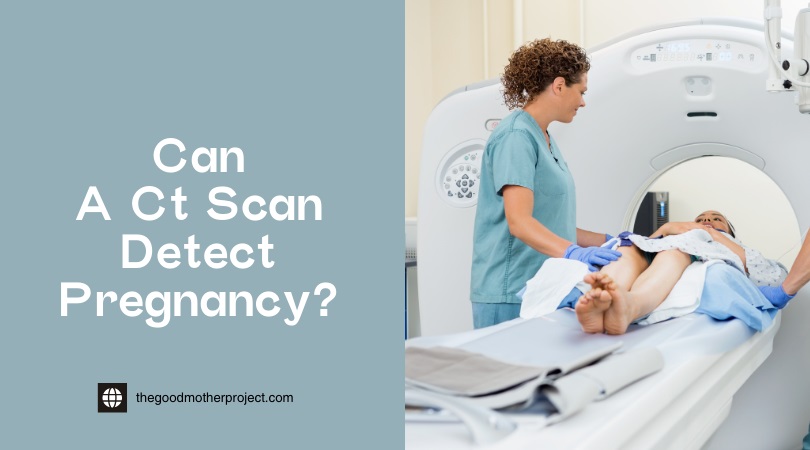Last Updated on January 6, 2025
A CT scan can detect pregnancy, but it is not the preferred method. Ultrasounds are more commonly used for confirming pregnancy.
CT scans utilize radiation, which poses risks to a developing fetus. While they can identify changes in the body associated with pregnancy, they aren’t designed for this purpose. Pregnant women usually undergo ultrasound examinations, as these are safer and more effective.
Ultrasounds provide clear images of the fetus and help monitor development. It’s essential to consult a healthcare provider for the best imaging option during pregnancy. Always prioritize the health and safety of both mother and baby. Understanding the appropriate methods for pregnancy detection can lead to better prenatal care and outcomes.
Ct Scans And Pregnancy Detection
Can a CT scan detect pregnancy? This question arises often. CT scans use X-rays to create detailed images. They are not designed for pregnancy detection. Let’s explore the basics of CT imaging and its limitations.
The Basics Of Ct Imaging
CT imaging stands for Computed Tomography imaging. It offers detailed pictures of internal organs. Here are some key points:
- Uses X-rays: CT scans use X-rays to take images.
- Fast Results: Scans are quick and efficient.
- High Detail: They show fine details of body structures.
- Common Uses: CT scans help diagnose injuries and diseases.
CT scans are popular in medical settings. They help doctors see inside the body. However, they are not the first choice for pregnancy detection.
Ct Technology’s Limitations For Pregnancy
CT technology has limitations regarding pregnancy detection. Here are some important factors:
| Limitation | Description |
|---|---|
| Radiation Exposure | CT scans expose patients to radiation. |
| Not Designed for Pregnancy | CT scans do not focus on detecting pregnancy. |
| Other Imaging Methods | Ultrasound is safer and more effective for pregnancy. |
| False Positives | CT scans may lead to misinterpretation of results. |
Doctors often recommend safer imaging methods. Ultrasounds are effective for confirming pregnancy. They do not involve radiation. Always consult a healthcare professional for accurate results.
Risks And Considerations For Pregnant Patients
Pregnancy brings unique health considerations. It is vital to weigh the risks of imaging tests like CT scans. These tests often involve radiation exposure, which can affect a developing fetus. Understanding these risks helps expectant mothers make informed choices.
Radiation Exposure Concerns
CT scans use X-rays to create images. X-rays can expose the fetus to radiation. This exposure may lead to potential health risks, such as:
- Increased risk of developmental issues
- Higher chances of childhood cancers
- Impact on fetal growth
Radiation levels in CT scans vary. The amount of radiation can be significant. The decision to perform a CT scan during pregnancy must be carefully considered.
| CT Scan Type | Radiation Dose (mGy) |
|---|---|
| Head CT | 2 |
| Chest CT | 8 |
| Abdominal CT | 10 |
| Pelvic CT | 10 |
Always discuss concerns with a healthcare provider. They can explain the risks clearly. Understanding these risks is essential for the health of both mother and baby.
Alternative Imaging Options
Several alternative imaging methods exist. These options may pose lower risks. Consider these alternatives:
- Ultrasound: Uses sound waves, no radiation involved.
- MRI: Uses magnetic fields, safer than CT scans.
- X-rays: Can be performed with precautions.
Ultrasound is often the first choice. It provides clear images without radiation. MRI may be used when more detail is needed.
Always consult with your doctor before any imaging. They can suggest the best option based on your situation. Prioritize safety for you and your baby.
Clinical Guidelines And Expert Recommendations
Understanding the clinical guidelines and expert recommendations regarding CT scans during pregnancy is crucial. Medical professionals must prioritize the health of both mother and fetus. These guidelines help ensure safe and effective medical imaging practices.
Medical Societies’ Stance On Ct During Pregnancy
Several medical societies have established guidelines regarding the use of CT scans in pregnant patients. Here are key points from their recommendations:
- American College of Obstetricians and Gynecologists (ACOG): CT scans should be avoided unless absolutely necessary.
- Radiological Society of North America (RSNA): Minimizing radiation exposure is essential.
- Society of Radiographers: Encourage alternative imaging methods like ultrasound or MRI.
These organizations emphasize the importance of weighing risks versus benefits. Pregnant women should receive the least amount of radiation possible.
Best Practices For Healthcare Providers
Healthcare providers must follow best practices to ensure patient safety. Here are some recommendations:
- Evaluate the necessity of the CT scan.
- Use shielding to protect the fetus from radiation.
- Consider alternative imaging methods first.
- Inform patients about potential risks.
- Document the decision-making process thoroughly.
Following these practices can help reduce risks associated with CT scans during pregnancy. Patient education is key to informed decision-making.
Frequently Asked Questions
Can A Ct Scan Confirm Pregnancy?
A CT scan is not designed to confirm pregnancy. Ultrasounds are the preferred method for this purpose.
What Does A Ct Scan Show In Pregnancy?
A CT scan can reveal certain conditions but is generally avoided during pregnancy due to radiation exposure risks.
Is Ct Safe For Pregnant Women?
CT scans involve radiation, which can pose risks to the developing fetus, making them generally unsafe during pregnancy.
Can A Ct Scan Detect Early Pregnancy?
CT scans are not effective for early pregnancy detection; ultrasounds and urine tests are better options for early results.
Why Avoid Ct Scans During Pregnancy?
Radiation from CT scans can harm fetal development, so safer imaging methods are recommended for pregnant women.
Conclusion
CT scans are not designed to detect pregnancy. They focus on imaging internal organs and tissues. If you suspect pregnancy, consider more suitable tests like ultrasound or blood tests. Always consult a healthcare professional for accurate diagnosis and guidance. Understanding your options is crucial for your health and well-being.








